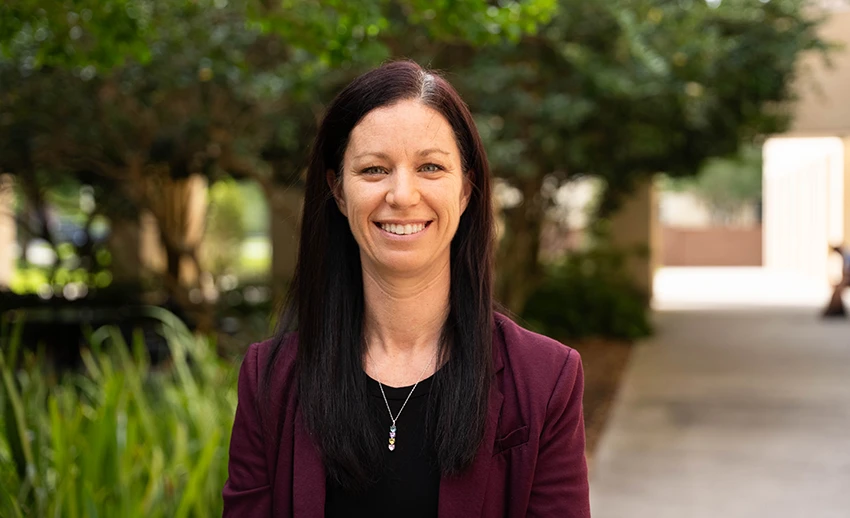
Kristina Childs Fisher, associate professor of criminal justice, is passionate about finding ways to help keep struggling youth out of the justice system. (Photo by Blake Osting)
Kristina Childs Fisher’s interest in mental health and psychology is what initially led her to consider a career as a therapist for children and adolescents. But after mentoring youth in the juvenile justice system during her time as an undergraduate student, her focus shifted.
Now an associate professor of criminal justice, one of the issues Childs Fisher is passionate about involves researching ways to improve the intersection of school, mental health and the juvenile justice system — and keeping youth out of the justice system.
According to the National Alliance on Mental Illness, one in six U.S. youth between the ages of 6 and 17 experience a mental health disorder each year, yet only half receive treatment. When a mental illness goes undiagnosed, untreated or inadequately treated, it can interfere with a child’s development and ability to learn. It also has the potential to lead to high rates of school dropout, unemployment, substance use, arrest and incarceration.
In her pursuit of solutions for reducing chances of involuntary commitments, Childs Fisher learned that officers sometimes struggle with handling mental health crises that occur in school settings, with little preparation in terms of distinguishing whether a crisis stems from a behavioral or mental health issue. For the past few years, she has worked with the Seminole County Sheriff’s Office and Community Counseling Center of Central Florida on addressing youth mental health crises through development of a mobile crisis unit.
The unit serves as a resource for officers to call upon if they determine a child may be experiencing a mental health crisis and seek assistance from a licensed mental health professional. Not only does this approach help ensure that officials are equipped with the resources necessary for a greater chance of success in de-escalating heightened situations, it also increases the potential of turning a child’s adverse experience into an opportunity to process their emotions and seek assistance while remaining in the community.
What inspired you to get into this field of study?
I have watched too many young people struggle with behavioral difficulties, substance abuse or mental health issues and enter different service systems but never truly benefit from their time in these systems. It created the desire to help improve how children and adolescents who have mental health problems or who have engaged in delinquent behavior are treated. My research is really focused on the intersection of mental health and the juvenile justice system, and how we can provide the right resources to keep kids out of these systems.
What does that look like in practice?
Police officers have very little preparation in terms of understanding whether behavioral or mental health issues are present. Symptoms of depression, anxiety and suicidal ideation may present additional challenges for police officers when determining the best course of action for each youth. My research focuses on preparing officers to properly identify mental health needs and crises and ensuring that the right resources are available to them.
You’ve been working on a project that has implemented a mobile crisis unit to help law enforcement officers in Seminole County handle youth mental health crises. How does it work?
When an officer or deputy determines that a youth might be experiencing a mental health crisis, they can request that an on-call therapist also responds. Once the therapist arrives on scene, they are debriefed and spend some time with the youth in crisis. The therapist provides their assessment to the officer to help determine whether involuntary commitment is needed or if the youth can be de-escalated with a safety plan. A care coordinator will follow up within 48 hours to continue helping the family access and coordinate community-based interventions. Our findings have shown that when the mobile crisis unit is involved, the odds of an involuntary commitment are reduced by over 90%.
What does community resilience look like as it relates to the juvenile justice system?
Regarding the justice system, resilience involves ensuring that decision makers have the requisite skills to make decisions that are fair, just and improve the well-being of the individuals involved. By providing mental health training and offering resources like the mobile crisis unit, we’re preparing mental health gatekeepers and providing resources to law enforcement officers to help them make informed decisions about how to properly respond to youth with mental health needs — all of which contributes to building community resilience.